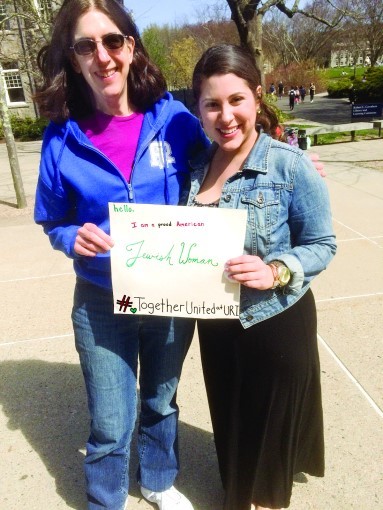URI students react to anti-Semitic fliers with calls for peace and unity
A printer hack during spring break at U.S. universities caught the eye of national media in March. The neo-Nazi group Daily Stormer claimed responsibility for the hack, which resulted in hundreds of campus printers across the country printing anti-Semitic and anti-LGBTQ fliers.
The University of Rhode Island was among the schools that were hacked, and URI Hillel’s executive director, Amy Olson, said there was also a second incident involving printed hate messages. The group or person responsible for the second incident was unknown as The Voice went to press.
After the first set of fliers was found on university printers, URI took immediate measures to publicize that it would not tolerate hatred and bigotry.
The fliers also inspired students from The Gender and Sexuality Center to collaborate with URI Hillel to start #printforpeaceURI, a social media campaign wherein students take pictures of themselves with messages of peace.
According to Olson, while many students were unaware of the fliers, since the hack occurred during spring break, in just a few weeks dozens of students participated in #printforpeaceURI.
Additionally, open forums to discuss the events were added to the agendas for a planned LGBTQ+ symposium and the campus’s Holocaust Remembrance Week.
“[The forums were] really to make the pronouncement that this is not URI. This is not what URI stands for,” explained Olson. “I think everyone was relieved that this had not originated with someone at URI, but it did offend the campus and we wanted to bring some healing to the campus.”
Jaclyn Rubin, a URI student who is involved in Hillel and in the Student Non-Violence Committee, also created a one-day campaign called Project Unity in response to the hateful messages.
Photos were snapped of participants standing silently, holding signs stating their identity, and posted on social media, including Twitter and Facebook, with the hashtag #togetherunitedaturi.
Olson said URI strives to create an inclusive community at all times, not just when pushed by bigotry and hate messages. On a campus where there’s a group to build bridges between different student populations that might not otherwise interact, such as Greek life and multicultural organizations, religious groups and athletes, Olson is optimistic that the flier incidents and resulting countermeasures will further bring URI’s students together.
“I hope it gets more people talking to each other and getting more people to hear each other’s stories, and learn about each other,” says Olson.
“It’s more than just an attack on the Jews,” she says. “What hurts one hurts us all.”
ARIEL BROTHMAN is a freelance writer who lives in Wrentham, Massachusetts.








